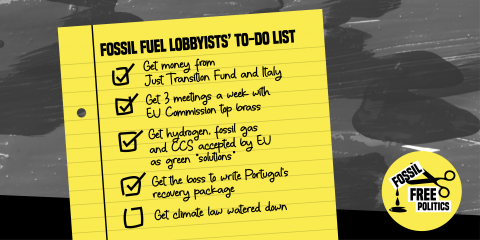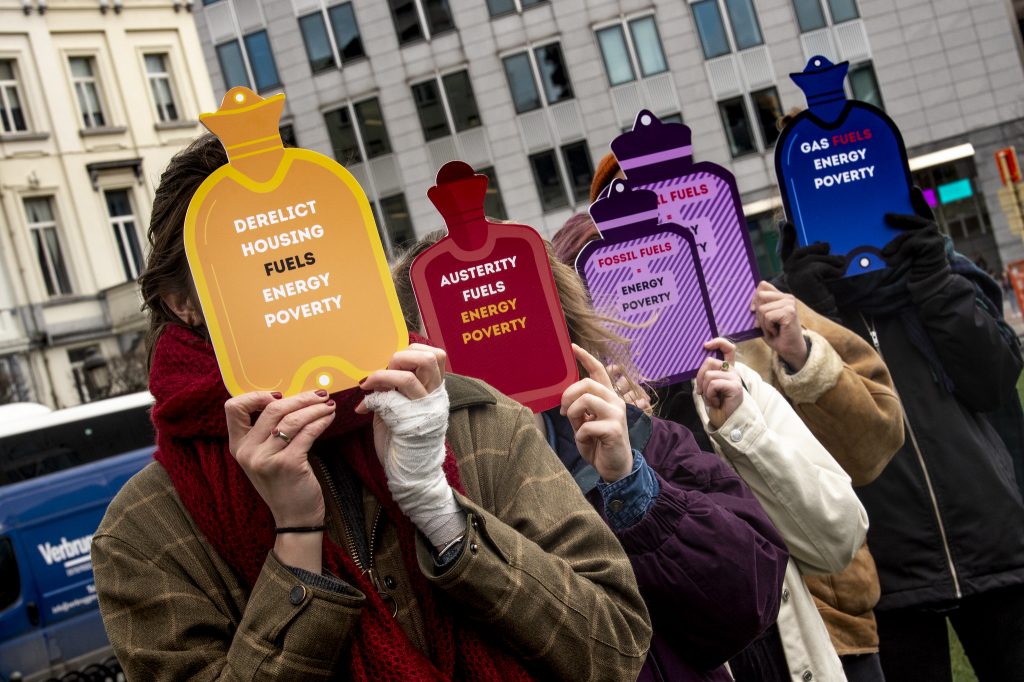
Under the guise of the Covid-19 pandemic, which has seen fossil fuel interests capture tens of billions of public recovery money, new research by the Fossil Free Politics campaign reveals a massive lobbying effort by the fossil fuel industry to win concessions for climate-damaging energy schemes across Europe, and weaken environmental standards and the European Green Deal.
As European lawmakers vote this week on a new EU Climate Law, subject to fierce lobbying by corporate polluters, campaigners warn that fossil fuel interests are gaining a foothold on the European Green Deal.
Despite European Commission and government promises to ‘build back better’, fossil fuel fingerprints are evident on national and EU recovery plans. Many recovery strategies plan to pour taxpayer’s money into the fossil fuel industry’s favourite false solutions, such as fossil gas, carbon capture and storage (CCS), carbon offsetting, and fossil hydrogen, which will worsen the climate emergency.
Recovery funds bailout fossil fuels
A barrage of lobbying towards EU institutions and governments has opened doors for recovery funds to be diverted to climate-damaging fossil investments. Italy has already given petrochemical firm Maire Tecnimont a €365 million state-backed loan as part of its recovery scheme. The European Central Bank, which did not impose environmental conditions, has used crisis bonds to bail out oil companies like Repsol, Shell, Eni, OMV, Total, and coal utility E.ON.
Fossil fuel companies are also successful in weakening or delaying environmental standards across Europe. In Italy and France, Covid-19 has resulted in the weakening of regulation on fossil fuels; these efforts are mirrored at EU-level, where polluting corporations are lobbying to delay and weaken the EU climate law.
Cosy access to decision makers
The fossil fuels industry has been aided by easy access to, and cosy relationships with, high-level decision-makers, with scant regard for conflicts of interest. Portugal hired an oil boss to draft its Covid-19 recovery plans. The European Commission’s top levels had three meetings a week with fossil fuel lobbyists while several European countries were in lockdown.
This report confirms again the enormous influence of the fossil fuel industry on government policies. The authors call for a firewall between decision-makers and fossil fuel lobbyists.
Myriam Douo, economic justice campaigner for Friends of the Earth Europe said:
“Fossil fuel companies have used the Covid lockdown to lobby hard for a generous slice of recovery funds pie – with extra cream on top. Bailout funds should be for rescuing stricken workers, small businesses and communities, but fossil fuel lobbyists are pushing billions to their favourite climate-killing energy projects, while undermining the EU Green Deal.
“Using EU public money to buy fossil fuelled corporate debt isn’t just a bailout – it’s giving a free rein to polluting coal, oil and gas companies, and is clearly incompatible with urgent climate action.”

Lala Hakuma Dadci, Fossil Free Politics coordinator, said:
“The Covid-19 pandemic has hit the worst-off hardest, and we need recovery plans that put the interests of people and planet first, not bailouts for the corporations that are profiting from further destroying our climate. Yet as long as powerful fossil fuel lobbyists have the ear of politicians, public policies will reflect their priorities. The EU climate law is a target of this undue shadowy influence. We must cut fossil fuel interests out of our politics, to ensure the fight against climate change and the Covid-19 recovery are conducted entirely in the public interest.”
Related Content
We think you’d also like:

European Green Deal
The European Green Deal has the potential to transform Europe’s economy to help fix the climate and ecological crises, and support workers in the transition. But it is in danger of being too little, too late.

Fossil Free Politics
Politicians should make climate laws to protect people – not please the fossil fuel industry. We need to cut fossil fuel interests out of our politics, similar to existing restrictions on the tobacco industry.







